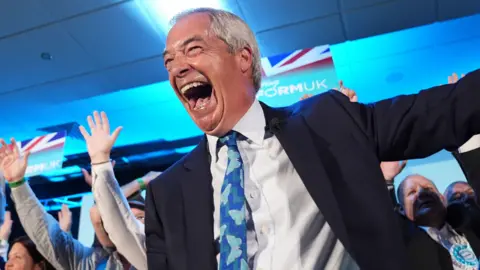Nigel Farage, the prominent British politician and Reform UK leader, is set to enhance his presence in Scotland as his party gears up for an ambitious election campaign. Following significant victories in England’s recent local elections, where Reform UK secured over 600 council seats and took control of ten local authorities, Farage aims to replicate this momentum north of the border. The success in England and the recent victory in the Westminster by-election for Runcorn and Helsby have energized the party, prompting a strategic focus on Scotland.
Scotland’s political landscape is subtly shifting as Thomas Kerr, a local councillor in Glasgow who switched from the Scottish Conservatives to Reform UK in January, indicates that the party sees a genuine opportunity to expand its influence. With a keen eye on the forthcoming Holyrood elections, the party believes it is capable of winning its first Members of the Scottish Parliament (MSPs) in what polls are predicting to be a favorable outcome.
Farage has publicly expressed his intention to visit Scotland more frequently, especially with the upcoming by-election for the Hamilton, Larkhall, and Stonehouse seat scheduled for June. Kerr noted that Farage’s enthusiasm is palpable; he is eager to engage directly with the Scottish electorate to broadcast Reform UK’s policy messages. Despite the party currently lacking a Scottish leader, the momentum appears promising for Reform UK.
The general political sentiment apprehends Farage’s anticipated impact. In elections past, Reform UK attracted 7% of the vote in Scotland during the last general election, with rising poll numbers suggesting a potential boost to their standing, especially at the expense of traditional parties such as the Conservatives and Labour. This is heightened by the impending by-election, providing Reform UK with an early opportunity to transform polling support into decisive votes.
In reflecting on previous visits, history reveals a more turbulent reception. A notable confrontation occurred back in 2013 when Farage was the head of his former party, UKIP; he was met with protests and had to be escorted by police. However, recent polling indicates that Reform UK’s average performance across nearly 30 local by-elections in Scotland would translate to meaningful parliamentary representation if repeated in the Holyrood elections.
A recent gathering led by First Minister John Swinney, aimed at addressing democratic values and countering misinformation on social media, suggests that the rising popularity of Reform UK and Farage is influencing even the highest echelons of Scottish governance.
The forthcoming by-election for the Hamilton, Larkhall, and Stonehouse seat occurs in the wake of the SNP’s Christina McKelvie’s passing in March. Kerr acknowledges the challenges ahead, predicting that attaining third place would be an appropriate target for Reform UK amidst an increasingly competitive landscape. However, he remains optimistic, citing significant voter turnout and the party’s 24% share in Fraserburgh and strong showings in Glasgow as trends indicative of reforming voter sentiment toward their party.
As both traditional parties like Labour and Conservatives reevaluate their positions on the back of last week’s election results, Scottish Labour leader Anas Sarwar articulated the need for his party to act decisively. He pointed to a declining vote share for Labour at its lowest since 2008, insisting that the party must “go further and faster” to win public support.
Sarwar’s remarks highlight concerns surrounding the effectiveness of promised reforms and improvements under the current Labour-led government at Westminster. He contended that a more positive narrative about Labour’s vision and future direction is vital, especially after months filled with controversy over cuts to winter fuel payments and changes to disability benefits.
In contrast, Russell Findlay, leader of Scottish Conservatives, remains skeptical of Farage’s influence and challenges the notion of Reform UK’s commitment to unionist values, reflecting a broader unease among established parties regarding the ascendant presence of Reform UK within Scottish politics. As all eyes turn to the impending by-election, the potential reshaping of political allegiances and voter dynamics remains a focal point in Scotland.



